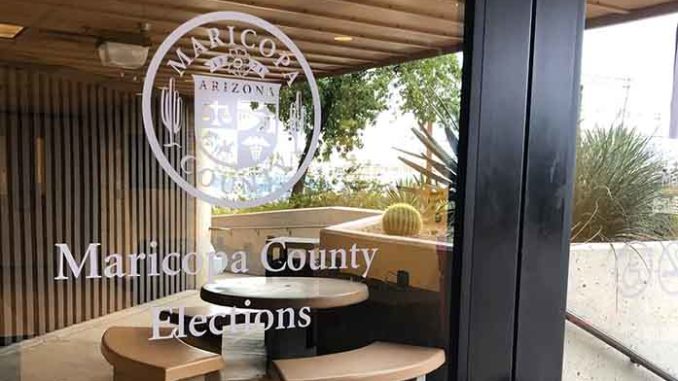
While the monotonous task of hand counting the nearly 2.1 million ballots cast during Maricopa County’s 2020 General Election continued Tuesday at Veterans Memorial Coliseum, the real audit excitement took place during a virtual court hearing.
“I am not yet persuaded that there has been a showing that the rights of the voters in Maricopa County are being protected,” Judge Daniel Martin of the Maricopa County Superior Court said at the conclusion of the status hearing. The hearing involves a lawsuit initiated last week by the Arizona Democratic Party and a Maricopa County Board Supervisor over purported concerns with how the audit is being conducted on behalf of the State Senate.
Martin has ordered the attorneys to participate in another hearing Wednesday morning which will center on whether the audit procedures developed by lead audit contractor Cyber Ninjas will remain under seal. He could also reissue a temporary restraining order related to the audit, but he allowed an initial TRO issued last Friday by another judge to expire during Tuesday’s hearing.
In the meantime, Martin encouraged the various parties to try to work out their differences outside the court. He also granted approval to Arizona Secretary of State Katie Hobbs to file an amicus curiae (friend of the court) brief, as well as the Maricopa County Libertarian Party and We The People AZ Alliance.
The judge later granted Hobbs formal status to intervene in the case as Arizona’s top election official. He also granted limited intervenor status to First Amendment and public records legal expert Dan Barr on the issue of whether Cyber Ninjas is exempt from disclosing its internal audit policies to the public.
Attorney Kory Langhofer has filed for dismissal of the lawsuit, arguing that his clients -Senate President Karen Fann, Sen. Warren Petersen of the Judiciary Committee, and Senate audit liaison Ken Bennett- are immune from such litigation. He is also arguing that the plaintiffs cannot show any specific voter who has been or will be injured if the audit continues.
One aspect of the hand count process that is known to the public involves volunteers passing what appears to be a black light over each ballot prior to it being scanned and reviewed by the counters. However, attorneys for Cyber Ninjas filed all of its procedures under seal for the judge’s review, so it’s uncertain what exactly the volunteers are looking for.
But that only encouraged public debate about the issue, which led to theories -mostly conspiratorial- about what the black light was intended to reveal, running the gamut from special colored ink to microscopic chips to watermarks invisible to the human eye. The controversy prompted the Maricopa County Elections Department to issue a public statement Monday about the matter.
“There are many security measures in place when creating and printing ballots, but there are no secret markings on the ballot,” the statement read.
Throughout Tuesday’s hearing the judge shared his preliminary thoughts with the attorneys, including his opinion that many of Arizona’s elections laws do not apply to the Senate’s audit. However, he noted there were some statutes which clearly do, Martin said.
And the judge was not sure whether the Senate’s legislative immunity claim is relevant to the audit activity, and if so, whether immunity trickles down to the paid audit contractors.
One issue Martin did not have to weigh in on Tuesday involves media access to Veterans Memorial Coliseum. Only one credentialed Arizona-based journalist is known to have made it on the floor last Friday where the hand count is taking place. Shortly afterward, Bennett stopped giving press briefings and no local reporters were allowed on the floor Saturday.
It was announced Tuesday that one representative of Arizona media will be allowed access to independently observe the audit activities during predesignated shifts. There can also be on media photographer and one videographer permitted during those shift, with all information to be shared with any interested media outlet.
One proposed intervenor who will not be involved in the litigation is Staci Burk, a woman who has gained notoriety in earlier election lawsuits for her claims about having evidence that someone delivered illegal ballots to Maricopa County’s election tabulation center. It is unclear what law enforcement agency, if any, Burk has disclosed such evidence to.
This Friday, the U.S. Supreme Court will decide whether to hear a petition from Burk who is seeking a court order permitting forensic fingerprint analysis of Maricopa County’s paper ballots. Burk recently asked the senate’s attorney to implement audit procedures that would ensure non-contaminating handling of the ballots, which she contends are evidence of possible criminal activity.
On April 22, Burk received an email from Langhofer, who reported he had “already alerted the audit team of the issue and asked them to wear gloves whenever handling ballots.” But Burk countered that gloves alone will not protect the ballots.
“Wearing gloves is NOT sufficient,” she emailed back to Langhofer. “It will still smear and make irrecoverable fingerprints and spoil the evidence.”
The answer, Burk wrote, was to ensure those handling the ballots follow “crime scene processing techniques which involve very delicate handling of evidence, even with gloves.” If not, Burk told Langhofer, “you are knowingly and willingly participating in the active spoliation of evidence of alleged major criminal activity.”
Martin told Burk he understood her concern about the ballots but ruled she did not meet the requirements to intervene in the current litigation.
